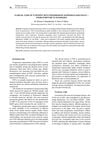 2 citations,
May 2023 in “International Journal of Molecular Sciences”
2 citations,
May 2023 in “International Journal of Molecular Sciences” The TRPV3 ion channel is important for skin and hair health and could be a target for treating skin conditions.
 1 citations,
November 2022 in “Anais Brasileiros de Dermatologia”
1 citations,
November 2022 in “Anais Brasileiros de Dermatologia” Many hospitalized children with COVID-19 had skin, mouth, or nail changes, with skin rashes being common.
 January 2024 in “Authorea (Authorea)”
January 2024 in “Authorea (Authorea)” Nanomaterials can significantly improve wound healing and future treatments may include smart, real-time monitoring.
 November 2023 in “Advanced Science”
November 2023 in “Advanced Science” A specific hair protein variant increases the spread of breast cancer and is linked to worse survival rates.
 April 2021 in “European medical journal”
April 2021 in “European medical journal” A COVID-19 patient had severe and long-lasting skin issues and unusual hair loss.
 49 citations,
July 2004 in “Anesthesiology”
49 citations,
July 2004 in “Anesthesiology” The document concludes that more research is needed to understand how to treat muscle pain with drugs.
 October 2022 in “Rheumatology (Bulgaria)”
October 2022 in “Rheumatology (Bulgaria)” Accurate diagnosis of progressive supranuclear palsy requires thorough neurological assessments and MRI.
 47 citations,
June 2011 in “Movement Disorders”
47 citations,
June 2011 in “Movement Disorders” The LRRK2-G2019S mutation in Parkinson's disease has a lifetime penetrance of 25-35%, and finasteride may help reduce symptoms in adult male Tourette syndrome patients.
 46 citations,
September 2011 in “Movement Disorders”
46 citations,
September 2011 in “Movement Disorders” Finasteride reduces Tourette syndrome symptoms, but results may be limited due to potential biases.
 39 citations,
May 2011 in “Movement Disorders”
39 citations,
May 2011 in “Movement Disorders” Finasteride may help reduce symptoms in male Tourette syndrome patients.
 34 citations,
December 2015 in “Neuroscience & Biobehavioral Reviews”
34 citations,
December 2015 in “Neuroscience & Biobehavioral Reviews” Some hormone-related drugs may protect brain cells in Parkinson's disease differently in men and women.
 31 citations,
June 2011 in “Movement Disorders”
31 citations,
June 2011 in “Movement Disorders” The document describes a woman with familial Parkinson's disease due to a genetic mutation, showing severe symptoms and poor response to treatment, and suggests finasteride may help reduce symptoms in Tourette syndrome.
 17 citations,
May 2011 in “Movement Disorders”
17 citations,
May 2011 in “Movement Disorders” Finasteride significantly reduced tics and obsessive-compulsive symptoms in patients with Tourette syndrome.
 10 citations,
June 2011 in “Movement Disorders”
10 citations,
June 2011 in “Movement Disorders” THAP1 gene changes do not affect DYT1 dystonia; finasteride may help reduce tics and OCD in Tourette syndrome.
 7 citations,
June 2011 in “Movement Disorders”
7 citations,
June 2011 in “Movement Disorders” A specific gene mutation is linked to a hereditary form of dystonia that responds well to certain medications.
 5 citations,
May 2011 in “Movement Disorders”
5 citations,
May 2011 in “Movement Disorders” Finasteride significantly reduced tics and obsessive-compulsive symptoms in Tourette syndrome patients.
 5 citations,
May 2011 in “Movement Disorders”
5 citations,
May 2011 in “Movement Disorders” Finasteride may help reduce tic severity in male Tourette syndrome patients.
 4 citations,
May 2011 in “Movement Disorders”
4 citations,
May 2011 in “Movement Disorders” A woman's unique dementia was misdiagnosed, a genetic mutation increases Parkinson's risk with age, and finasteride may help with Tourette syndrome.
 1 citations,
August 2021 in “Canadian journal of neurological sciences”
1 citations,
August 2021 in “Canadian journal of neurological sciences” Woodhouse-Sakati syndrome can cause writer's cramp and other varied symptoms, highlighting the importance of genetic testing for diagnosis.
 1415 citations,
October 2007 in “European Journal of Epidemiology”
1415 citations,
October 2007 in “European Journal of Epidemiology” The Rotterdam Study investigates diseases in older adults and has produced many research findings.
 359 citations,
September 2017 in “European Journal of Epidemiology”
359 citations,
September 2017 in “European Journal of Epidemiology” The Rotterdam Study updated findings on elderly health, focusing on heart disease, genetics, lifestyle effects, and disease understanding.
 336 citations,
August 2015 in “European Journal of Epidemiology”
336 citations,
August 2015 in “European Journal of Epidemiology” The Rotterdam Study found risk factors for elderly diseases, links between lifestyle and genetics with health conditions, and aimed to explore new areas like DNA methylation and sensory input effects on brain function.
 266 citations,
November 2013 in “European Journal of Epidemiology”
266 citations,
November 2013 in “European Journal of Epidemiology” The Rotterdam Study aims to understand disease causes in the elderly and has found new risk factors and genetic influences on various conditions.
 247 citations,
August 2011 in “European Journal of Epidemiology”
247 citations,
August 2011 in “European Journal of Epidemiology” The Rotterdam Study updated its design and objectives in 2012, providing insights into various diseases in the elderly, including skin cancer, bone health, liver disease, neurological and psychiatric conditions, and respiratory issues.
 219 citations,
September 2009 in “European journal of epidemiology”
219 citations,
September 2009 in “European journal of epidemiology” The Rotterdam Study aims to understand various diseases in older adults.
 191 citations,
February 2002 in “Archives of Dermatology”
191 citations,
February 2002 in “Archives of Dermatology” Some herbal therapies may help with skin conditions, but more research is needed to confirm their safety and effectiveness.
 28 citations,
January 2021 in “Parkinsonism & related disorders (Online)/Parkinsonism & related disorders”
28 citations,
January 2021 in “Parkinsonism & related disorders (Online)/Parkinsonism & related disorders” Parkinson's disease is linked to skin disorders and skin cells help in studying the disease.
 1 citations,
March 2024 in “Signal transduction and targeted therapy”
1 citations,
March 2024 in “Signal transduction and targeted therapy” NF-κB signaling is crucial in many diseases and can be targeted for new treatments.
 February 2023 in “Aesthetic Cosmetology and Medicine”
February 2023 in “Aesthetic Cosmetology and Medicine” Medicinal plants in nutricosmetics contain compounds that can improve skin and hair health.

Early NAS level changes affect alcohol consumption vulnerability.






























